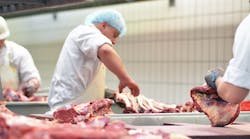Smithfield Foods Sued by Worker’s Group for Unsafe Working Conditions, Inadequate PPE
A lawsuit filed by a group called the Rural Community Workers Alliance and an anonymous Smithfield Foods, Inc. employee alleges the company failed to provide adequate protective equipment for workers at their Milan, Missouri pork plant. According to the complaint, Smithfield punished workers for covering their mouths while coughing or sneezing, creating an actionable “public nuisance.” A company spokesperson said the allegations are “without factual or legal merit.”
The lawsuit is the latest headache for the Virginia-based meat processor which has been owned by Chinese company WH Group since 2013. The largest pork producer in the world, Smithfield had to close its huge Sioux Falls, South Dakota pork plant after the area governor and mayor wrote that the factory was a locus for coronavirus transmission within the state.
As a business deemed essential under most quarantine orders, Smithfield left many of its plants open and suspended production at other locations in Missouri and Wisconsin as well as South Dakota. On April 27, South Dakota governor Kristi Noem said in an interview with Fox News that she hoped the Sioux falls facility would reopen “as soon as possible.”
On April 24, a day after the lawsuit was filed, Smithfield suspended operations at its Monmouth, Illinois facility after some employees tested positive for COVID-19. In a statement on the Monmouth plant’s closure, Smithfield said it has addressed the spread of the virus “proactively and aggressively” by providing employees with masks, installing physical barriers, and implementing thermal scanning.
The lawsuit from the RCWA disputes some of those details. According to the RCWA and the anonymous employee, Smithfield didn’t provide masks to any of its Milan plant workers until April 16—two weeks after workers at the plant sent a letter to the company expressing fear they were being put at risk.
That letter, sent April 2, also complained that Smithfield initially punished workers for taking sick leave, and the lawsuit alleges that Smithfield actually continues to do so. The lawsuit further alleges that Smithfield incentivized workers to come into work sick by offering a $500 bonus to employees who didn’t miss a shift between the first days of April and May.
In a statement released April 24, Smithfield contradicted the complaint’s characterization of its sick leave policy. “The company has been explicitly instructing employees not to report to work if they are sick and that they will be paid,” the statement read. Smithfield also noted that meat processing is a particularly difficult environment to implement social distancing in.
“The inherent nature of meat processing, which is labor intensive, assembly line style production, makes social distancing particularly challenging,” it said. Other meat processing companies have experienced friction with their employees during the COVID-19 outbreak, including JBS USA and Tyson.
The lawsuit seeks an injunction that would force Smithfield foods to follow “CDC guidance, the orders of state public health officials, and additional protective measures” deemed necessary by public health experts. The case is Rural Community Workers Alliance v. Smithfield Foods Inc, U.S. District Court for the Western District of Missouri, No. 5:20-cv-06063.
